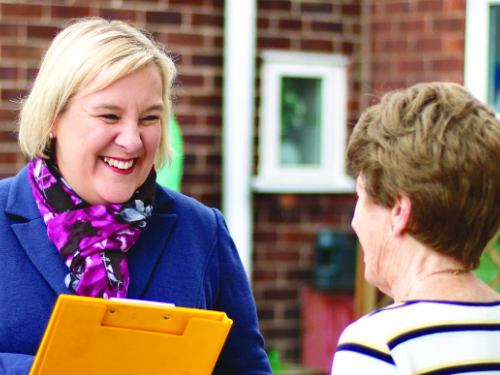
The mantra has remained the same for as long as I can remember. If you want to win an election as a Liberal Democrat, especially a local election, you need to knock on doors and put leaflets through letter boxes. You need to do it a lot. However, I am regularly asked how true this is now. Isn’t social media of growing importance? Isn’t email more effective? Following a local election, it is useful to look at the evidence.
The advent of Connect has given us a number of advantages but one of these is being able to track canvassing activity over time and see how that relates to success in local elections. Of course, just knocking on doors is never a 100% guarantee.
I track contact rates month by month for ALDC. I don’t look at doors knocked but at the actual numbers of doors were we have recorded information. The distinction is vital. Doors knocked can show how hard a team are working, but don’t show the impact they are making. It is actually having a conversation on the door and gathering data that is vital. The initial contact on the doorstep changes perceptions of us as candidates and a party. That data allows us to build an ongoing relationship with voters, by direct mail and future door knocking.
In a public blog post, I am not going to publish detailed statistics (that would be too useful to other people) but I will be doing presentations to fellow Lib Dems at the Summer Kickstart event and, hopefully, at Autumn Conference.
As the results came in, they may have topped expectations but there weren’t too many real surprises.
For instance, Chichester had a great result, gaining 14 seats and more than doubling their group size to take overall control. A brilliant result but it was clear it was going to be if you looked at the statistics. They were high up in the national canvassing league table month after month, and topped the contact rates for the South East Region this year.
Sticking with the South east, the top half of the canvassing table did consistently well. In the bottom half, the results were, at best, very mixed.
For a very different example, my own local party, which elects by thirds, had three tricky defences against Labour in May. In those wards Labour won two of them last year and we had held one by 38 votes. Labour were supremely confident of winning all three this time. Our tactic? Lots of canvassing. It can be tough to spend a lot of time knocking on the doors of Labour voters but it is effective. We comfortable won all three seats. In the most spectacular result of the night, our deputy leader turned a Labour majority in 2022 of 439 into a Lib Dem majority of 265.
I should make clear that fighting and winning elections is complex. Social media and emails do have an impact. There are places that win without much canvassing (but often with a lot of literature, even for Lib Dems). I know areas that have limited literature but lots of canvassing. Of course, local factors can often have a big impact, as can national trends. Who your opponents are can be a big factor. All these are true, but in the end the evidence is clear:
Talking to a lot of voters, and starting to do it months before an election, has a huge impact. Consistently high contact rates are a very good predicter of election success.
Whenever your next elections are, there is no better time to start knocking on doors again than now.
You can find templates for Canvass Cards. Summer Surveys and more door-knocking items here.